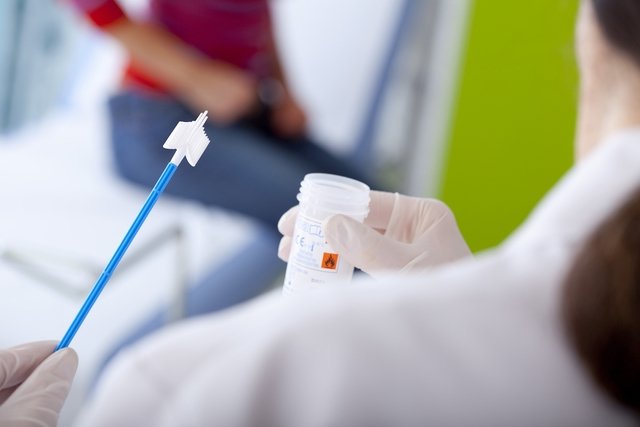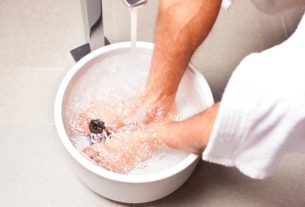Urethritis is a urinary infection that causes inflammation of the urethra and causes symptoms such as pain when urinating, discomfort or burning in the intimate area and discharge with pus.
Urethritis can be caused by bacteria transmitted during sexual intercourse, such as Neisseria gonorrhoeae e Chlamydia trachomatisor be a consequence of the use of a urinary catheter.
If urethritis is suspected, it is important to consult a urologist, gynecologist or general practitioner so that the diagnosis can be made and the most appropriate treatment can be initiated, which normally involves the use of antibiotics.

Urethritis symptoms
The main symptoms of urethritis are:
- Greenish-yellow, whitish or bloody discharge or pus from the urethra;
- Itching in private parts;
- Pain when urinating;
- Burning sensation or discomfort in the genital region;
- Redness in the region around the urethra;
- Appearance of swelling in the groin;
- Blisters and wounds in the genital region, in some cases.
In male urethritis, there may also be discomfort or pain when touched in the testicle region and redness at the tip of the penis. In women, bleeding after sexual intercourse or pain during intercourse may also be noticed.
Sometimes, the symptoms of urethritis are confused with those of urethral syndrome, which is an inflammation of the urethra that causes symptoms such as abdominal pain, urinary urgency, pain and irritation when urinating, and a feeling of pressure in the abdomen.
Read too: Urethral syndrome: what it is, symptoms, causes and treatment
How to confirm the diagnosis
The diagnosis of urethritis can be made by a urologist, gynecologist or general practitioner taking into account the symptoms presented, and a urine test may also be indicated to confirm the diagnosis. In addition, analysis of urethral secretions or urine is generally indicated to identify the cause of urethritis and initiate the most appropriate treatment.
Make an appointment with your nearest doctor, using the following tool, to confirm urethritis and begin the most appropriate treatment:
Taking care of your health has never been easier!
Possible causes
The main causes of urethritis are:
- Bacteria infectionas Neisseria gonorrhoeae e Chlamydia trachomata;
- Virus infectionsuch as herpes simplex;
- Protozoaas Trichomonas vaginalis.
The infectious agents normally associated with urethritis are transmitted sexually. Learn about the main causes of sexually transmitted infections.
Types of urethritis
According to the cause, urethritis can be classified into:
- Gonococcal urethritiswhen caused by the bacteria Neisseria gonorrhoeaewhich is the same bacteria that causes gonorrhea;
- Nongonococcal urethritiswhen inflammation of the urethra is caused by other microorganisms.
It is important that the type of urethritis is confirmed by the doctor so that the most appropriate treatment can be initiated.
How the treatment is carried out
Treatment of urethritis depends on the cause and usually involves the use of antibiotics depending on the type of urethritis:
In the treatment of nongonococcal urethritisis normally used:
- Azithromycin: 1g, orally in a single dose or;
- Doxycycline: 100 mg, orally, twice a day, for 7 days.
To treat the gonococcal urethritisthe use of:
- Ceftriaxone: 250 mg, by intramuscular injection in a single dose and;
- Azithromycin: 1g, orally in a single dose.
Furthermore, when urethritis is caused by the use of a bladder catheter, antiseptic products or friction, it is recommended to change or discontinue the product that may be causing the irritation, wear looser clothing or remove the bladder probe, for example.
Does urethritis heal on its own?
Urethritis usually does not heal on its own, because in most cases it occurs due to bacterial infection and its treatment involves the use of antibiotics. However, when treatment is carried out according to the doctor’s guidance, it is possible to cure urethritis.
Bibliography
- SELL, Jarrett; NASIR, Munima; COURCHESNE, Chloe. Urethritis: Rapid Evidence Review. Am Fam Physician. Vol.1, n.103. 553-558, 2021
- STATPEARLS. Urethritis. 2022. Available at: <https://www.ncbi.nlm.nih.gov/books/NBK537282/>. Accessed on Nov 9, 2022
- LEOS-ALVARADO, C. et al. Male urethritis. A review of the ideal diagnostic method. Urol Esp Proceedings (Engl Ed). Vol.44, n.8. 523-528, 2020

Sign up for our newsletter and stay up to date with exclusive news
that can transform your routine!
Warning: Undefined array key "title" in /home/storelat/public_html/wp-content/plugins/link-whisper-premium/templates/frontend/related-posts.php on line 12
Warning: Undefined array key "title_tag" in /home/storelat/public_html/wp-content/plugins/link-whisper-premium/templates/frontend/related-posts.php on line 13




